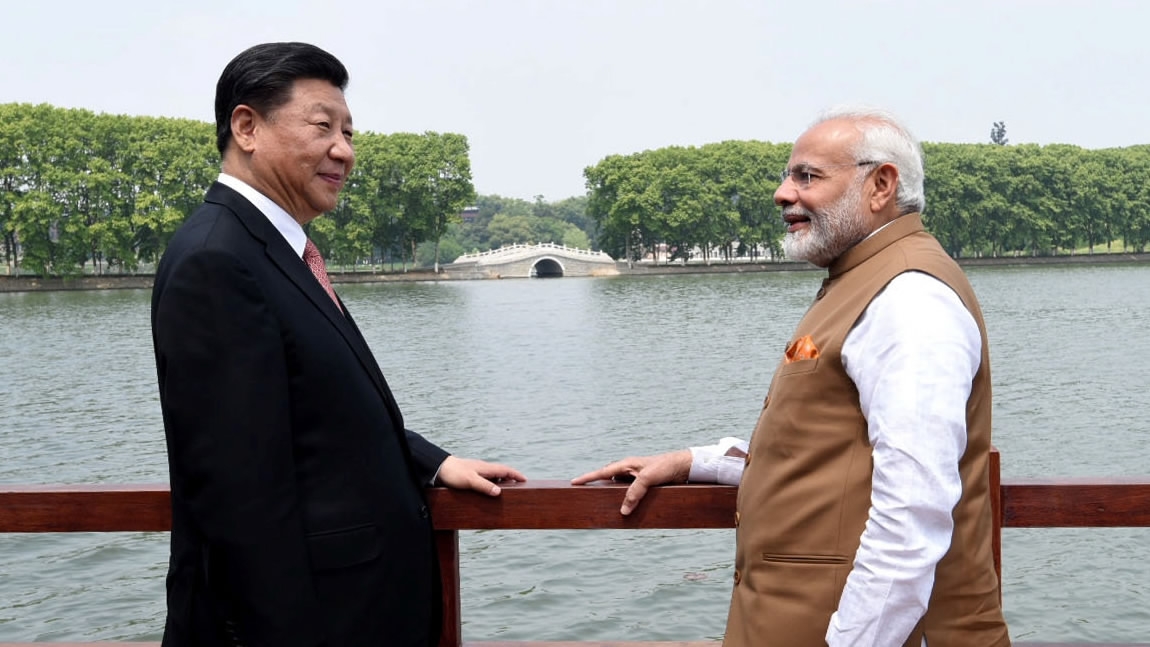Following Chinese President Xi Jinping's informal meeting with Indian Prime Minister Narendra Modi in Wuhan late last month, there are signs that New Delhi might be warming up to some of the projects under the China-proposed Belt and Road Initiative (BRI). Key projects on India's radar are a rail link connecting Afghanistan with Central Asia and China; a corridor linking China, Nepal and India; and the Bangladesh-China-India-Myanmar (BCIM) economic corridor.
India has so far refused to participate in the BRI saying the China-Pakistan Economic Corridor (CPEC), the flagship project of BRI, passes through the disputed territory of Kashmir and therefore violates New Delhi's sovereignty.
The apparent softening of India’s position comes as Modi prepares to visit China again next month to attend the annual summit of Shanghai Cooperation Organization (SCO) in the eastern coastal city of Qingdao. India and Pakistan were admitted to the SCO last year and the Qingdao summit will be their first as full members.
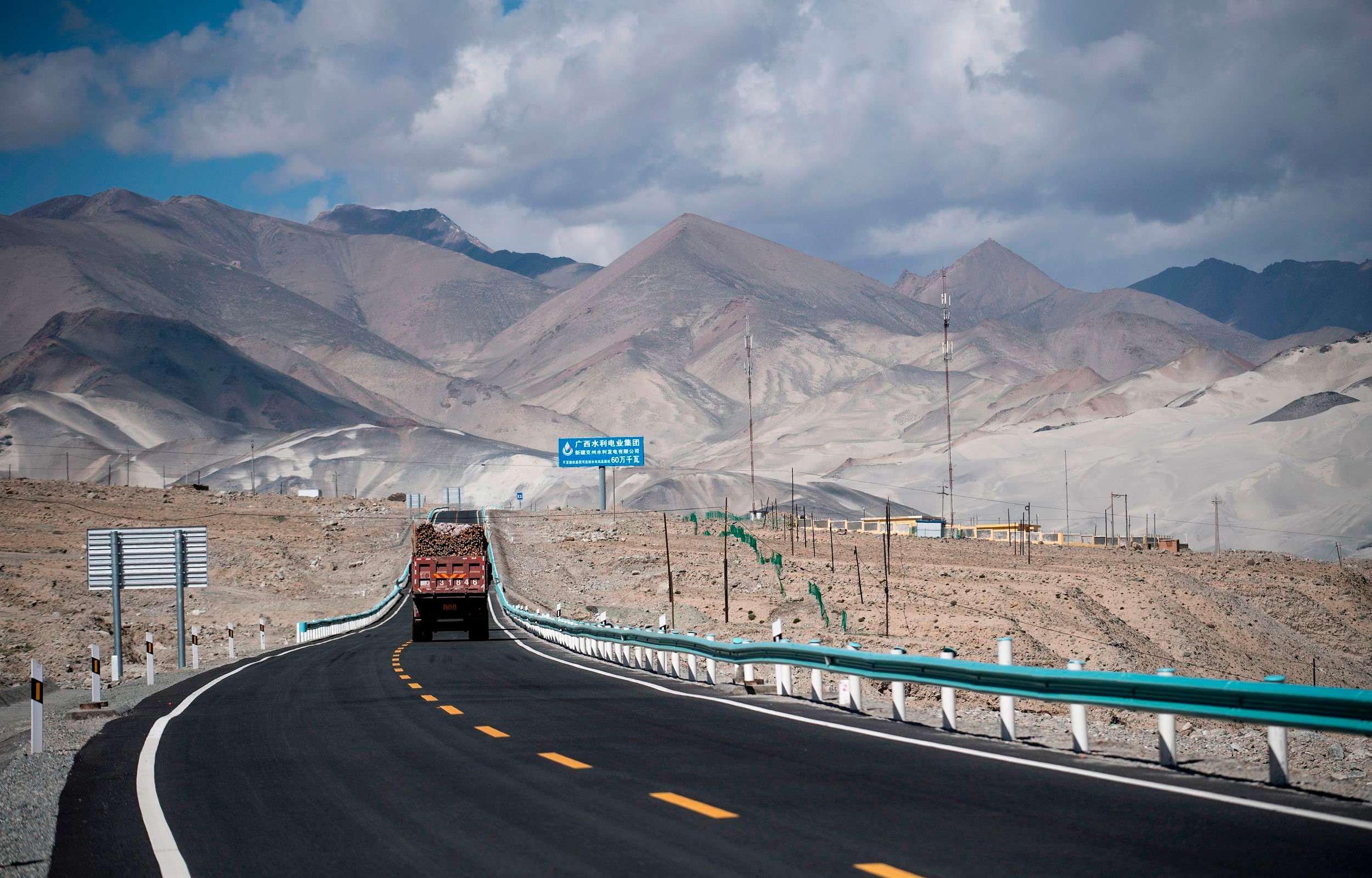
A truck drives along the China-Pakistan Friendship Highway before the Karakorum mountain range near Tashkurgan in China's western Xinjiang Province, on June 27, 2017. /VCG Photo
A truck drives along the China-Pakistan Friendship Highway before the Karakorum mountain range near Tashkurgan in China's western Xinjiang Province, on June 27, 2017. /VCG Photo
After the Wuhan talks between Xi and Modi, it was announced that among other things, China and India agreed to undertake joint economic projects in Afghanistan. This was followed by a statement from the Afghan Ministry of Economy announcing that a railway line between Afghanistan, Tajikistan, Kyrgyzstan, Iran and China is one of the joint projects being taken up by India and China.
India is helping build part of a road and rail network which connects the Iranian port of Chabahar with Afghanistan, and then on to Central Asia in the north. And Afghanistan and China also signed an MoU on the BRI in May 2016, the statement said.
Also last month, China’s State Councilor and Foreign Minister Wang Yi urged India to get involved in its connectivity projects with Nepal. “We should build a three-dimensional connectivity network across the Himalayas,” Wang stressed, adding: “As a long-term vision, this great channel will create conditions and provide convenience for the trilateral economic corridor of China, Nepal, and India, which is likely to be built in the future. The shared goal of the three countries should be to work together to achieve common development and common prosperity.”
Wang’s remarks came during his meeting with Nepal’s Foreign Minister Pradeep Kumar Gyawali and just days ahead of India’s External Affairs Minister Sushma Swaraj’s visit to Beijing, where she attended the SCO foreign ministers’ meeting.
While India remained the only SCO member not to endorse the BRI in the joint communique released after the foreign ministers’ meeting in Beijing, Modi and Xi’s "informal summit" in Wuhan has created an air of bilateral bonhomie.
'No principled disagreements'
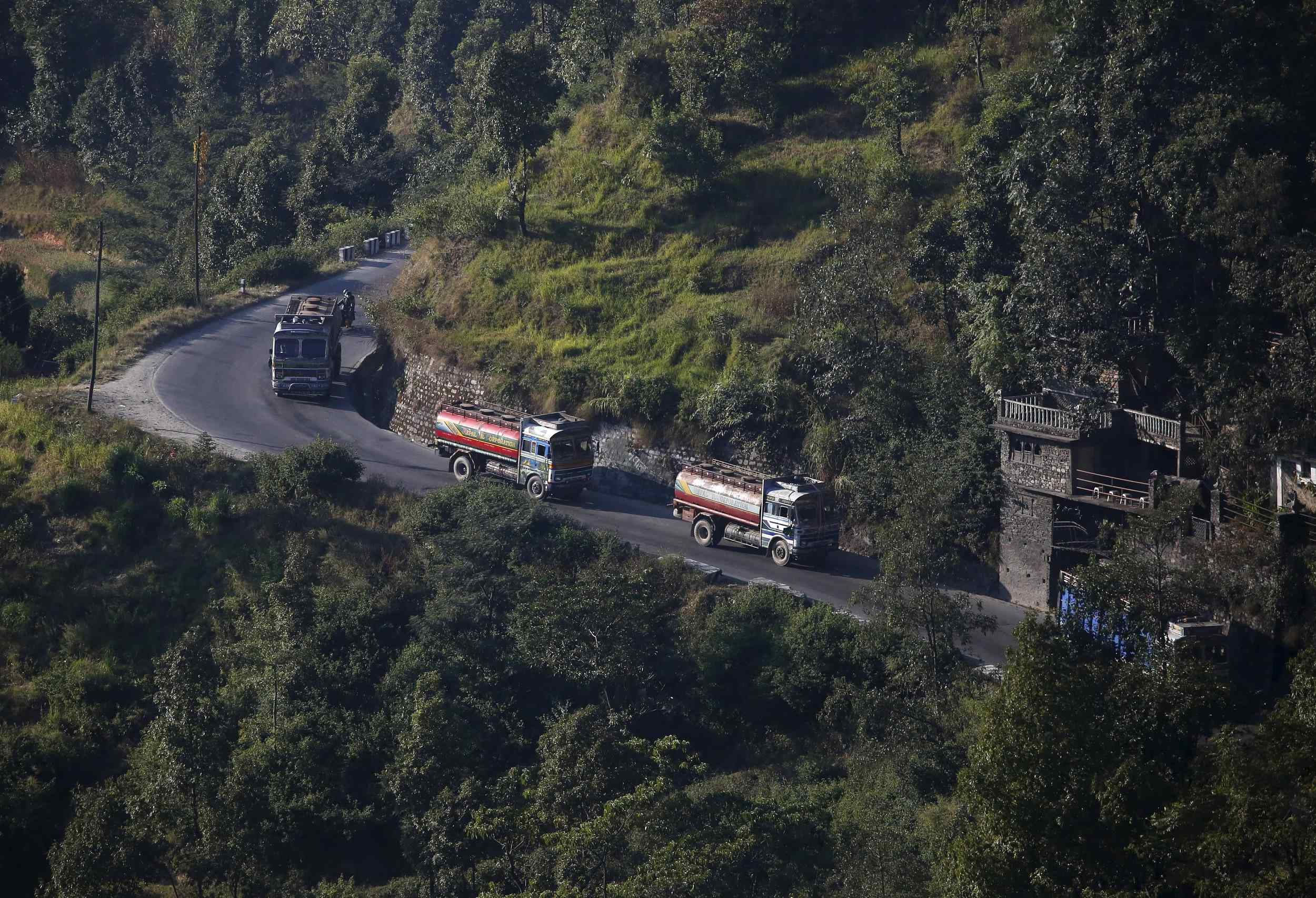
Nepalese petrol tankers heading to the Chinese border of Kerung are pictured on a road on the outskirts of Kathmandu, Nepal November 2, 2015. /VCG Photo
Nepalese petrol tankers heading to the Chinese border of Kerung are pictured on a road on the outskirts of Kathmandu, Nepal November 2, 2015. /VCG Photo
After the Wuhan summit, Chinese Vice Foreign Minister Kong Xuanyou downplayed the difference over BRI, saying China has no issues with India not supporting the BRI as long as both sides shared common views on connectivity.
“When it comes to connectivity my impression is that China and India do not have any principled disagreements,” Kong said, adding: “As for whether India accepts the expression Belt and Road, I think it is not important and China will not be too hard on it.”
Kong also stressed that both the nations are collaborating on the BCIM corridor, which China sees as part of the BRI but India sees as a multilateral project that predates the BRI by several years.
The Indian Prime Minister, who visited Nepal on May 11 and 12, spoke of connectivity being a top priority, nearly echoing the Chinese officials’ remarks but stopped short of vouching for a trilateral corridor as Wang did. “Better connectivity leads to enhanced India-Nepal friendship. That is why topmost priority is being given to boosting connectivity,” he said.
Meanwhile, SCO Secretary-General Rashid Alimov visited New Delhi last week and among a series of meetings with top Indian officials included crucial deliberations with Transport Minister Nitin Gadkari, who extended full support to SCO's transport cooperation.
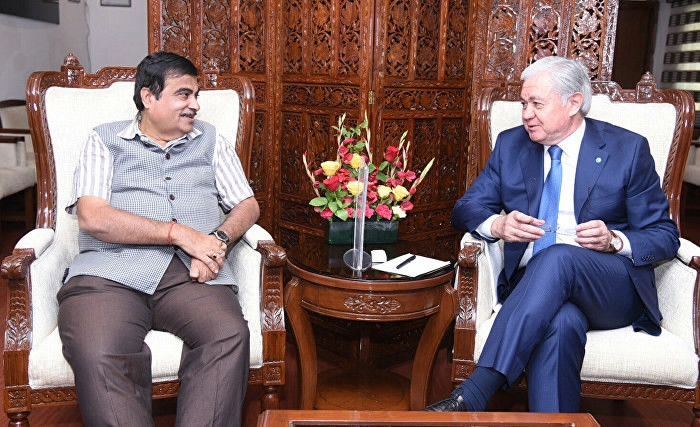
SCO Secretary-General Rashid Alimov (right) meets with India’s Minister of Road Transport and Highways, Shipping and Water Resources, Nitin Gadkari in New Delhi on May 8, 2018. /Photo via SCO
SCO Secretary-General Rashid Alimov (right) meets with India’s Minister of Road Transport and Highways, Shipping and Water Resources, Nitin Gadkari in New Delhi on May 8, 2018. /Photo via SCO
"Transport is a most important area of cooperation in the SCO. Achieving progress in this field helps ordinary people and has an impact on the development of the region's economy and infrastructure," Alimov told Gadkari, according to a press statement released by the SCO. He expressed his hope that India would join the active work that is being done to promote SCO transport cooperation.
Gadkari responded saying India plans to give full support to transport cooperation in the SCO. “We regard the SCO platform as a possible breakthrough in the construction of world-class roads and interconnections, which, in turn, form the basis of our countries' industrial development," the minister said.
'Ways around the impasse'
Analysts say that the recent developments indicate an agreement between Xi and Modi that India would quietly join BRI-linked projects while formally sticking to its official stand of opposing the initiative over CPEC. Some of the projects could be joined under the SCO framework while others will be on a multilateral basis.
“As both Delhi and Beijing push for mega trans-border connectivity around the [South Asian] subcontinent, the viability of the projects would significantly improve if there is cooperation between India and China,” C Raja Mohan, director of Carnegie India, wrote in a piece titled “India’s China reset and the Belt and Road Initiative.”
“Consider the fact that financing for China’s hydroelectric projects in Nepal would be lot easier if the power plants are linked to North Indian markets. Similarly, the proposed Indian and Chinese rail lines in Nepal would be more efficient if they are part of sensible trade and transit agreements between Delhi, Kathmandu and Beijing,” he elucidated.
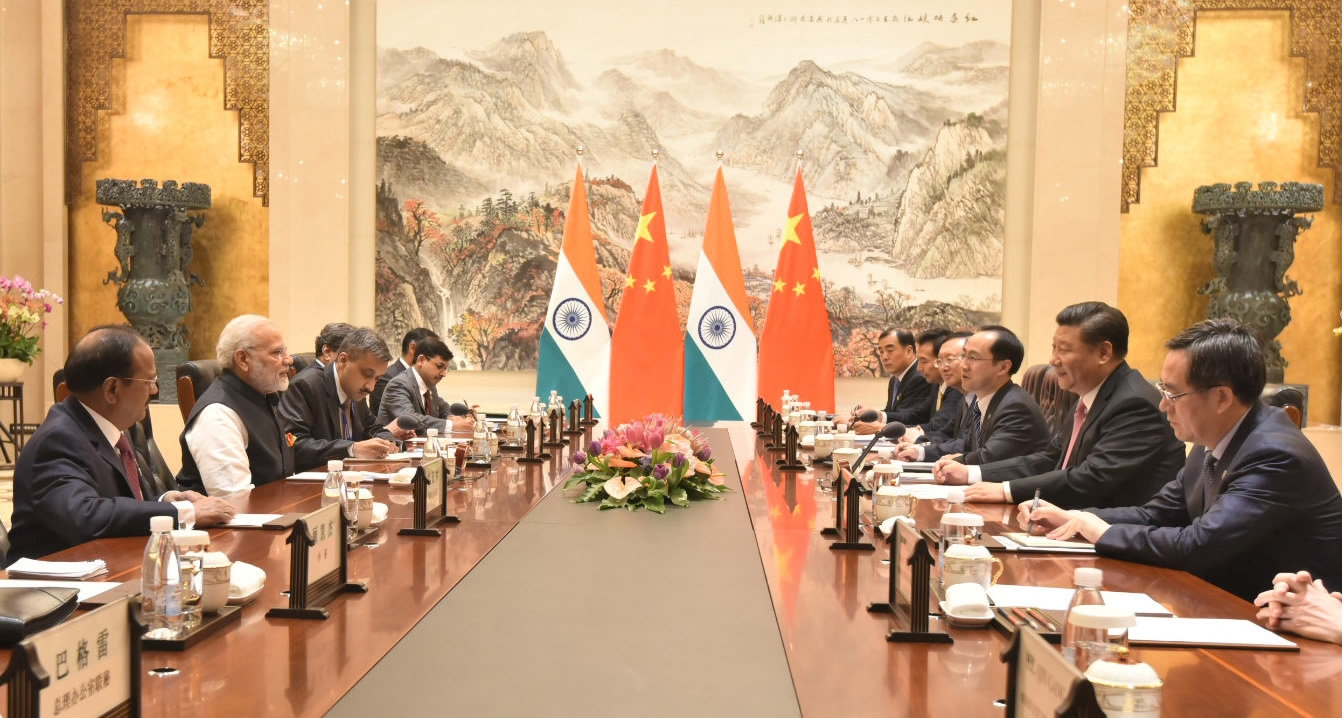
Chinese President Xi Jinping and Indian Prime Minister Narendra Modi attend a
meeting at East Lake Guest House, in Wuhan, China, April 27, 2018. /VCG Photo
Chinese President Xi Jinping and Indian Prime Minister Narendra Modi attend a
meeting at East Lake Guest House, in Wuhan, China, April 27, 2018. /VCG Photo
Raja Mohan reasoned that the subcontinent’s geography and the size of India’s market make it plain that many BRI projects will be hugely successful if India is part of them.
“Persistent competition and conflict between India and China on regional connectivity would make many projects of both countries less efficient. Political distrust between Delhi and Beijing, which has sharpened in the last two years, would seem to make reconciliation on the BRI near impossible,” Raja Mohan cautioned, but felt that “quite clearly, there are ways around the impasse.”
A senior Indian diplomat told CGTN Digital that “while India will continue to oppose CPEC, there’s no reason why that shall stop us from joining other segments of the BRI if they coincide with our strategic interests.”
It will be interesting to find out if Modi offers any further indication on India’s "softening" stance on the BRI during the forthcoming SCO summit in Qingdao.
[Cover Photo: Chinese President Xi Jinping and India's Prime Minister Narendra Modi walk along
the East Lake in Wuhan, China, April 28, 2018. /VCG Photo]

